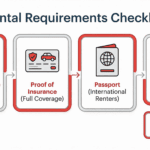Can You Take a Rental Car Out of State?
Using a rental car has many advantages, such as practicality, economy, and comfort. Although most people use rental cars for short distances, for some people, it is an ideal solution for vacations or more distant tourist spots. But can you take a rental car out of state?
In the following, we discussed the details of traveling with a rental car outside the state. In addition, we emphasized the most important factors before you set off on the road with a rented vehicle.
Can You Take a Rental Car Out of State?
So, can you take a rental car out of state? In short, yes, you can rent a car and drive outside the state.
Most companies allow car rentals with certain company rules and policies that you must follow. Therefore, before you decide to rent a vehicle, you should familiarize yourself with the terms and conditions of the rental agreement, the types of insurance you need, and the additional fees.
You should also be aware that some rental companies have certain restrictions and prohibitions when traveling with a rental car outside the state. Accordingly, there are rental companies that have mileage limits or geographic restrictions. Some rental companies may even prohibit leaving state borders.
So, in order to have a safe out-of-state drive, contact the rental company and familiarize yourself with the details before planning your trip.
State Laws and Car Rental Policies
State laws and regulations are an important factor to consider before hitting the road out of state. While there are consistent rules that apply in all states, certain laws only apply to specific states. In the following, we will consider the most important factors that you should take into account:
Limited driving through certain states
Some rental companies have a limit on distance and one-way rental. Such restrictions are usually introduced by small or regional companies that don’t have offices outside the state.
For example, suppose you rent a car in California. In that case, you can drive in neighboring states like Nevada, Arizona, or Oregon, but you won’t be able to drive in more distant places like New York or Pennsylvania. Due to the distance, these rental companies will not be able to accept drop-offs or provide you with additional assistance.
Traffic laws
Although traffic rules and laws are generally consistent across the US, there may still be some differences in certain states. Therefore, before you travel, familiarize yourself with the traffic rules that apply to the state you are visiting.
Pay toll
When traveling outside the state, pay attention to tolls. Although some rental companies offer an electronic way of toll payment, some companies charge processing fees.
Driver’s age”
Before you hit the road, ensure you are of the required age to drive a rental car out of state. In most states, you need to be at least 20 years old to be able to rent a car.
However, there are exceptions, such as New York and Michigan, where you can rent a vehicle with a minimum age of 18, while you must be at least 19 to rent a vehicle in Alabama and Nebraska.
Pickup and return policy of the rental company
Keep in mind that most companies have different policies when it comes to pickup and return of the rental car. While some rental companies offer more flexible return times, there are rental companies that have strict policies. Therefore, when planning your trip, ensure the pickup and return policy matches your travel itinerary.
Factors to Consider Before Taking a Rental Car Out of State
Before heading out of state with a rental vehicle, you should know out-of-state guidelines and regulations. Therefore, below, we will look at the factors you should consider before crossing state lines.
Rental agreement
To travel with a rental car, you need to know the rental agreement well. Namely, rental companies have special policies regarding traveling outside the state.
Such policies can vary from company to company, so it is important to clarify the fee requirements and limitations they have for you. If you have unclear questions, it is important to contact the rental company to get all the necessary answers regarding the contract.
Restrictions for certain states
Some rental companies have special restrictions on which states you can visit. Such limitations are due to several factors, such as maintenance coverage in different states, toll policies, or different insurance regulations.
So, before you go on a trip, check if the rental company has restrictions for the state you want to visit and if there are additional costs for crossing the borders.
Insurance coverage and requirements
Insurance coverage is perhaps the most important factor to consider before heading out of state. So, first, check if your current insurance policy covers out-of-state travel. If not, you might want to explore other options.
You can contact the rental company and learn about the types of insurance they offer. Many rental companies have out-of-state insurance that gives additional protection and coverage. Just carefully consider your insurance choices and ensure you have everything you need.
Additional fees and charges
Driving a rental car out of state may incur additional charges. Such charges may relate to one-way rental fees or mileage surcharges.
In some companies, there are also drop-off fees if you return the car to a different location than the place where you picked it up. That’s why it’s important to contact the rental company and learn about these potential costs to plan your budget.
Conclusion
Although most rental companies allow driving out of state, you should be familiar with all their regulations and policies. In addition, it is crucial to know the rental agreements and necessary documents, as well as the possible restrictions and state limitations.
Finally, we hope you learned how can you take a rental car out of state and what factors you should pay attention to. We advise you to drive safely and follow the traffic rules in any state you visit.






